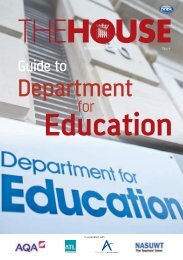Oracy
2fcBkno
2fcBkno
Create successful ePaper yourself
Turn your PDF publications into a flip-book with our unique Google optimized e-Paper software.
Why does oracy matter?<br />
Both the literature and teachers’ views highlight a range of reasons why oracy matters. xii While this<br />
section explores the areas in which teachers feel oracy contributes to pupils’ development, we look in<br />
Sections 4 and 5 at reasons why some teachers do not engage with oracy as systematically as they<br />
do with reading, writing and numeracy.<br />
<strong>Oracy</strong> helps pupils... 906<br />
Understand and use language<br />
64% 29%<br />
Increase their confidence and independance<br />
64% 30%<br />
Develop their understanding of particular subjects<br />
52% 39%<br />
Explore and understand their feelings and empathise<br />
with others<br />
Voice opinions, and participate in activities in school and the<br />
wider community<br />
Extend their career prospects, and meeting employers’ needs<br />
48% 39%<br />
33% 48%<br />
27% 41%<br />
0% 20% 40% 60%<br />
80% 100%<br />
Proportion who believe oracy supports pupils’ development in<br />
this area ‘a great deal’<br />
Proportion who believe oracy supports pupils’ development in<br />
this area ‘a fair amount’<br />
Language and communication<br />
A number of studies suggest that focusing on<br />
oracy can enhance pupils’ ability to develop<br />
spoken language and communicate effectively and<br />
appropriately. One experimental study shows that<br />
activities involving ‘argumentation’, learning to<br />
reason and build arguments, can improve pupils’<br />
ability to build and use arguments in lessons and<br />
transfer these skills to other subjects. 44 Qualitative<br />
research and literature reviews also point to<br />
benefits associated<br />
with oracy in this respect, suggesting it may:<br />
• Enhance pupils’ ability to communicate with<br />
greater clarity and effectiveness, 45,46 particularly<br />
those who find self-expression through writing<br />
difficult, 47 for whom English is not a first<br />
language, 48 or who have forms of Speech,<br />
Language and Communication Needs (SLCN) 49<br />
• Help build vocabulary 50<br />
“Oral language, ‘oracy’, is the most<br />
fundamental communication tool”<br />
Professor Frank Hardman xiii<br />
Links between oral language skills and literacy,<br />
as well as broader educational outcomes,<br />
have frequently been highlighted in academic<br />
literature, 51,52,53,54,55 and in particular for younger<br />
children and those who struggle to learn to<br />
write (including those with a related form of<br />
special educational need). 56 Teachers play an<br />
important role in developing their pupils’ spoken<br />
vocabulary, which in turn can boost the pupils’<br />
decoding skills 57 and reading comprehension 58,59<br />
again particularly among younger children 60,61<br />
and learners with additional educational needs. 62<br />
Furthermore, a young child’s ability to say words<br />
confidently can have a direct impact on their<br />
spelling which, in turn, can support their writing. 63<br />
xii<br />
Practitioners were asked how they thought oracy contributes to pupils’ development in different ways, with oracy<br />
defined as ‘the development of children’s capacity to use speech to express their thoughts and communicate with others<br />
in education and in life, and talk through which teaching and learning is mediated’ (based on Alexander, 2012: 10).<br />
xiii<br />
Key informant interview.<br />
25




